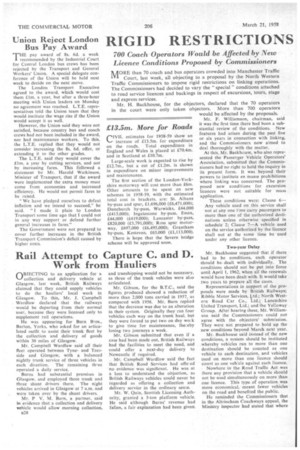Rail Attempt to Capture C. and D. Work from Hauliers
Page 32

If you've noticed an error in this article please click here to report it so we can fix it.
Qi3JECTING to an application for a collection and delivery vehicle at Glasgow, last week, British Railways claimed that they could supply vehicles to do the hauliers' local work in Glasgow. To this, Mr. J. Campbell Wardlaw declared that the railways would be departing from their normal user, because they were licensed only to supplement rail operations. He was appearing for Burn Bros., Barton, Yorks, who asked for an articulated outfit to assist their trunk fleet by the collection and delivery of goods within 30 miles of Glasgow. Mr. Campbell Wardlaw said all their fleet operated between Tyneand Teesside and Glasgow, with a balanced nightly trunk service of three vehicles in each direction. The remaining thee operated a daily service. Burns had substantial premises in Glasgow, and employed three trunk and three shunt drivers there. The night vehicles arrived in Glasgow at 7 a.m, and were taken over by the shunt drivers. Mr. P V. M. Burn, a partner, said in evidence that a collection and delivery vehicle would allow morning collection,
n28
and transhipping would not be necessary, as three of the trunk vehicles were also articulated. Mr. Gibson, for the B.T.C., said the figures produced showed a reduction of more than 2,000 tons carried in 1957, as compared with 1956. Mr. Burn replied that the decrease was due to an alteration in their system. Originally they ran four vehicles each way on the trunk haul, but they were forced to put two on day wok to give time for maintenance, thereby losing two journeys a week. Mr. Gibson submitted that even if a case had been made out, British Railways had the facilities to meet the need, and could offer a next-day delivery to Newcastle if required. Mr. Campbell Wardlaw said the fact that British Road Services had offe-ed no evidence was significant. He was at a loss to understand the objection, as British Railways vehicles could never be regarded as offering a collection and delivery service in the ordinary sense. Mr. W. Quin, Scottish Licensing Authority, granted a 3-ton platform vehicle. He said although Burns' revenue had fallen, a fair explanation had been givert,








































































































